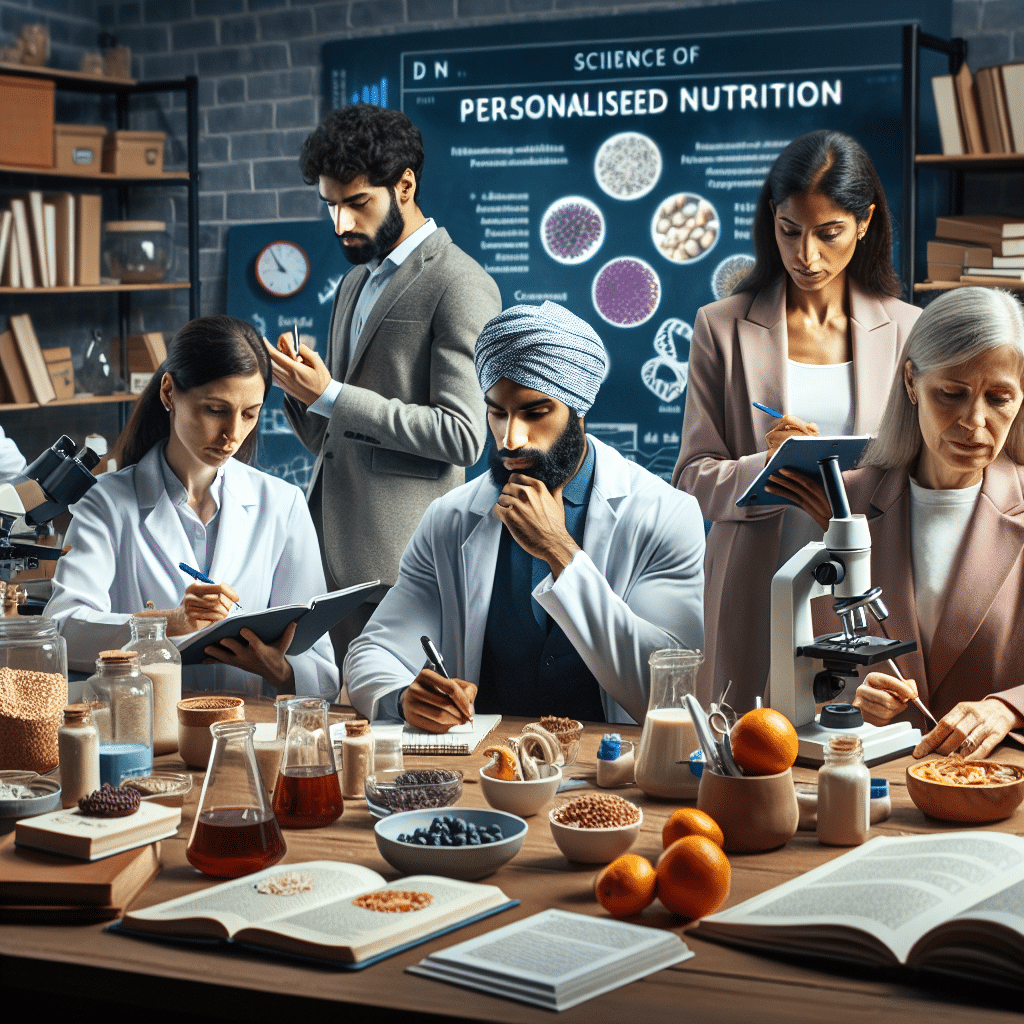Scientific Advisory Council Digs Into the Science Behind Personalised Nutrition
-
Table of Contents
- Personalized Nutrition Unveiled: The Science Behind Tailored Diets
- The Genesis of Personalized Nutrition
- Decoding the Science: Genetics and Nutrigenomics
- Microbiome and Personalized Nutrition
- Technology and Data-Driven Nutrition
- Case Studies and Evidence
- Challenges and Considerations
- Conclusion: The Future of Personalized Nutrition
- ETprotein: Your Partner in Personalized Nutrition
Personalized Nutrition Unveiled: The Science Behind Tailored Diets

Personalized nutrition is a rapidly evolving field that promises to revolutionize the way we think about diet and health. By tailoring food choices to an individual’s genetic makeup, lifestyle, and health goals, personalized nutrition aims to optimize well-being and prevent disease. The Scientific Advisory Council, a body of experts in nutrition, genetics, and biotechnology, has been delving into the science that underpins this innovative approach to eating. This article explores the findings of the council and the implications for the future of dietary guidance.
The Genesis of Personalized Nutrition
Personalized nutrition is not a new concept, but recent advances in science and technology have propelled it to the forefront of health and wellness discussions. The idea is rooted in the understanding that each person’s body responds differently to various foods and nutrients due to genetic variations, microbiome composition, metabolic rates, and other individual factors.
Decoding the Science: Genetics and Nutrigenomics
At the heart of personalized nutrition is the field of nutrigenomics—the study of how our genes interact with the nutrients we consume. The Scientific Advisory Council has been examining how genetic variations can affect nutrient metabolism, absorption, and utilization, which in turn can influence health outcomes.
- Genetic Testing: By analyzing an individual’s DNA, scientists can identify specific genetic markers that may predispose them to nutrient deficiencies or excesses.
- Gene-Diet Interactions: Certain genetic profiles can increase the risk of developing diet-related diseases such as diabetes, obesity, and heart disease.
- Personalized Dietary Recommendations: Based on genetic information, personalized diets can be designed to mitigate these risks and promote optimal health.
Microbiome and Personalized Nutrition
The human microbiome, the collection of trillions of microbes living in and on our bodies, is another critical factor in personalized nutrition. The Scientific Advisory Council has been exploring how the composition of the microbiome influences digestion, immune function, and even mental health.
- Microbiome Analysis: Cutting-edge techniques allow for the assessment of an individual’s gut flora, providing insights into their unique microbial ecosystem.
- Diet-Microbiome Interactions: Different diets can alter the microbiome, potentially improving or worsening health outcomes.
- Targeted Probiotics and Prebiotics: Personalized nutrition plans may include specific probiotics and prebiotics to support a healthy microbiome.
Technology and Data-Driven Nutrition
Technology plays a pivotal role in the advancement of personalized nutrition. Wearable devices, mobile apps, and artificial intelligence are some of the tools that the Scientific Advisory Council has identified as key to collecting and analyzing personal health data.
- Wearable Devices: Trackers that monitor physical activity, sleep patterns, and even blood glucose levels provide valuable data for tailoring nutrition plans.
- Mobile Apps: Apps can help individuals track their dietary intake, offering personalized feedback and recommendations.
- Artificial Intelligence: AI algorithms can process vast amounts of data to identify patterns and predict individual responses to different dietary interventions.
Case Studies and Evidence
The Scientific Advisory Council has reviewed numerous case studies that demonstrate the effectiveness of personalized nutrition. For instance, a study on personalized glycemic responses showed that individuals have unique blood sugar reactions to the same foods, which can be used to develop customized diets for better blood sugar control.
Another study focused on personalized weight management strategies, finding that tailored diets based on genetic information led to more significant weight loss compared to one-size-fits-all diets.
Challenges and Considerations
Despite the promise of personalized nutrition, the Scientific Advisory Council acknowledges several challenges that must be addressed:
- Accessibility: Personalized nutrition services can be expensive and may not be accessible to all populations.
- Regulation: The lack of standardized regulations for genetic testing and data privacy raises concerns about the misuse of personal health information.
- Ethical Implications: There are ethical considerations regarding genetic discrimination and the potential for exacerbating health disparities.
Conclusion: The Future of Personalized Nutrition
The Scientific Advisory Council’s research into personalized nutrition has laid the groundwork for a future where dietary recommendations are tailored to individual needs. By leveraging genetic information, microbiome composition, and technological advancements, personalized nutrition has the potential to transform public health and improve individual outcomes. As the science continues to evolve, it is clear that personalized nutrition will play a significant role in the future of dietary guidance and health care.
ETprotein: Your Partner in Personalized Nutrition
As personalized nutrition gains traction, the demand for high-quality protein sources that cater to individual dietary requirements is on the rise. ETprotein is at the forefront of this movement, offering a range of organic bulk vegan proteins and L-(+)-Ergothioneine (EGT) that support personalized nutrition plans.
Whether you’re looking for plant-based proteins like rice, pea, or pumpkin seed protein, or specialized ingredients like L-(+)-Ergothioneine for its antioxidant properties, ETprotein has you covered. Their products are non-GMO, allergen-free, and come with a guarantee of purity and quality, making them the ideal choice for those seeking to implement personalized nutrition strategies.
For more information on how ETprotein can support your personalized nutrition needs, contact them at sales(at)ETprotein.com today.
About ETprotein:
ETprotein, a reputable protein and L-(+)-Ergothioneine (EGT) Chinese factory manufacturer and supplier, is renowned for producing, stocking, exporting, and delivering the highest quality organic bulk vegan proteins and L-(+)-Ergothioneine. They include Organic rice protein, clear rice protein, pea protein, clear pea protein, watermelon seed protein, pumpkin seed protein, sunflower seed protein, mung bean protein, peanut protein, and L-(+)-Ergothioneine EGT Pharmaceutical grade, L-(+)-Ergothioneine EGT food grade, L-(+)-Ergothioneine EGT cosmetic grade, L-(+)-Ergothioneine EGT reference grade and L-(+)-Ergothioneine EGT standard. Their offerings, characterized by a neutral taste, non-GMO, allergen-free attributes, with L-(+)-Ergothioneine purity over 98%, 99%, cater to a diverse range of industries. They serve nutraceutical, pharmaceutical, cosmeceutical, veterinary, as well as food and beverage finished product distributors, traders, and manufacturers across Europe, USA, Canada, Australia, Thailand, Japan, Korea, Brazil, and Chile, among others.
ETprotein specialization includes exporting and delivering tailor-made protein powder and finished nutritional supplements. Their extensive product range covers sectors like Food and Beverage, Sports Nutrition, Weight Management, Dietary Supplements, Health and Wellness Products, and Infant Formula, ensuring comprehensive solutions to meet all your protein needs.
As a trusted company by leading global food and beverage brands and Fortune 500 companies, ETprotein reinforces China’s reputation in the global arena. For more information or to sample their products, please contact them and email sales(at)ETprotein.com today.












